Sep 16, 2023
Harshul Asnani
One Line Life Lessons from Harshul
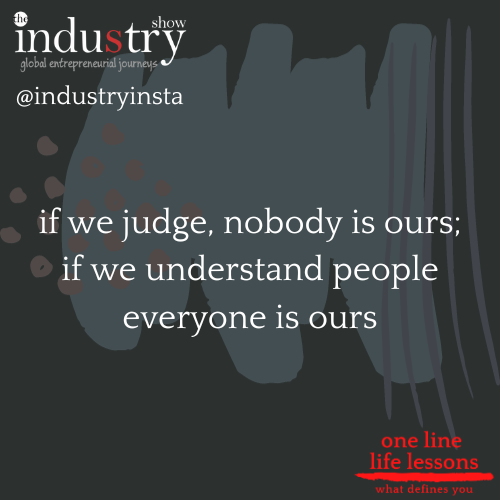
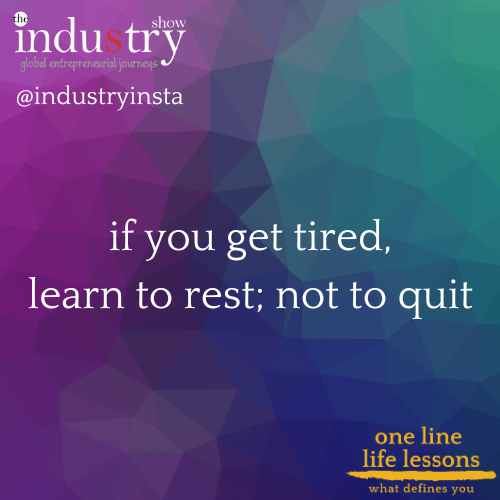
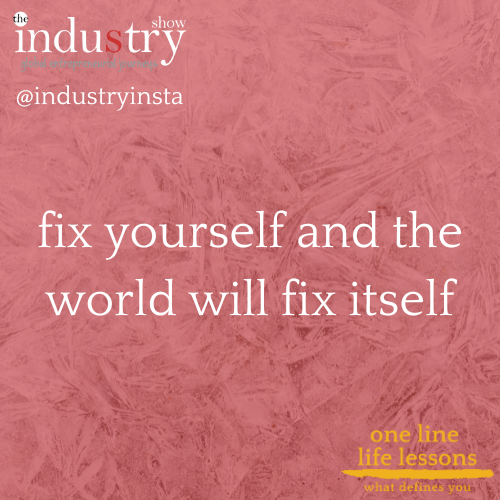
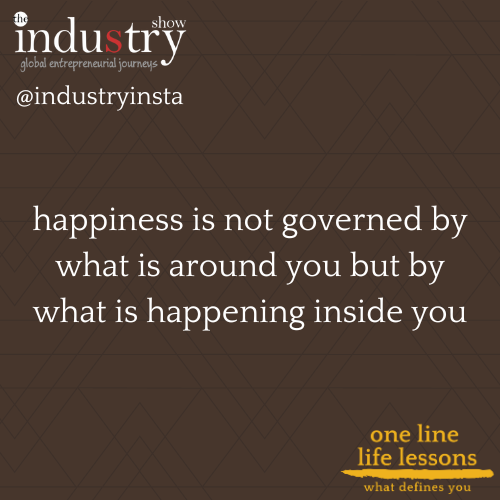
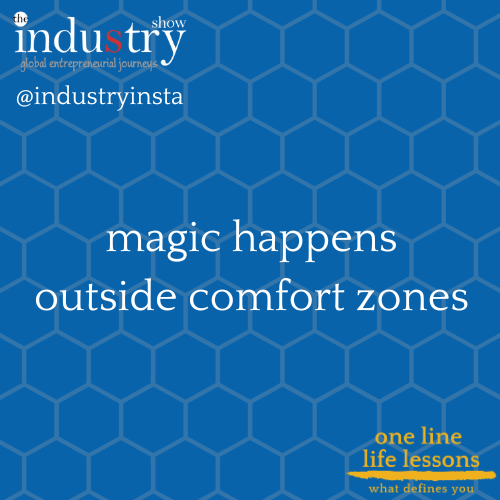
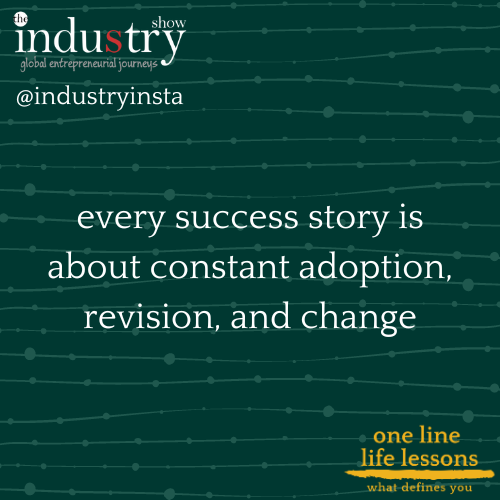
Episode Highlights
- (0:00:00) – Nitin Bajaj welcomes Harshul Asnani to the show
- (0:00:14) – Who is Harshul? Well, it depends on who you ask
- (0:03:11) – Tech Mahindra is over 150,000 people company in technology services
- (0:05:46) – Tech Mahindra is navigating through uncertain times amid disruptive technologies
- (0:09:14) – Harshul: Everything is heavily impacted by generative AI today
- (0:11:52) – Two moments in your life that worked out beyond your expectation became lessons
- (0:14:52) – What defines a successful leader is what your teams accomplish under your leadership
- (0:16:06) – Beyond work, what do you do for fun
- (0:17:56) – Harshul shares his favorite one line life lessons
- (0:22:03) – Going from a scarcity mindset to a mindset of abundance
Show Transcript
Transcript - Full Episode
Nitin Bajaj: (0:00:00) – Hey everyone, welcome to The INDUStry Show. I’m your host, Nitin Bajaj. And joining me today is the Harshul Asnani. Harshul, welcome on the show.
Harshul Asnani (0:00:10) – Thank you. Thanks Nitin for having me.
Nitin Bajaj: (0:00:13) – Pleasure is all ours. Let’s start with who is ah, who is Herschul?
Harshul Asnani (0:00:19) – I think. Well, it depends on who you ask. Let’s see, if you ask my close friends, they would say I’m an eternal optimist who finds humor in their daily life. I am that self proclaimed master of really bad jokes. My puns are so bad they’re almost good. Let’s just say that I’m on a mission to spread positivity one bad joke at a time. And they’ll also say that I’m probably on a mission to break the record for the most terrible dance moves ever witnessed. And by the way, if you ever need a companion for karaoke night, consider me as your go to guy. But just don’t say that I didn’t warn you. But well, on a more serious note, I would say that I am someone who’s curious, a builder at heart, a traveler. I love to hike. I’m generally an adventure seeker, if you will. I wish I had more time to quench this so called the wanderlust I would call myself as a loyal friend. And above all, I think I am grateful. I’m grateful for this wonderful life and blessing bestowed upon me. I call myself as a work in progress. I believe we all are work in progress in some way or the other. And I simply strive to be a better version of myself every day. But beyond this philosophical answer, I would say that I’m a small town guy, grew up in India, rooted in the middle class ethos of India that gave me my grounding, my and the core values that have shaped my life and work wise. I moved to the US about two decades ago. I’ve been in the valley for most of the time that I’ve been in the. I’ve worked mostly in the technology services industry, a large part of my career in tech Mahindra between two stints that I’ve played in the company. And I’ve also worked in companies like Pipro, HCL, Putney, pro, damp also. So all in all, it’s been a fun ride.
Nitin Bajaj: (0:02:38) – And I can attest to every single thing you said. You have been the true eternal optimist. You are the source of energy wherever we are, at any event, at any gathering. And you are where the action is.
Harshul Asnani (0:02:51) – Yeah, thank you.
Nitin Bajaj: (0:02:52) – I can attest to those things now. I will take you up and challenge you for the karaoke. So stay tuned for that.
Harshul Asnani (0:03:00) – Yes, absolutely. And as I said, don’t say that I didn’t warn you.
Nitin Bajaj: (0:03:06) – Hey, warning taken. And I still want to do it. So give us a sense for what Tech Mahindra is. The size, the scale, but also the mission, the vision and the transformation. It has happened over the past several years.
Harshul Asnani (0:03:26) – Yeah, sure. Tech manager is over 150,000 people company in technology services, business consulting and digital transformation project. We are part of the Mahindra Group, which is a conglomerate of federated companies across multiple sectors from auto to agri to aerospace, defense, energy. And in tech Mahindra, our play in the whole technology led digital transformation spectrum really is around four vectors. One is around cloud, it and systems. Second is process automation. Third one is product engineering and our core capabilities on everything from what we call as chip to the cloud and also uniquely around network services. Given the heritage that we have as a telecom focused organization when we started 40 years ago. So today we have a presence in about 90 countries, or 1200 plus customers, and operate in numerous industry verticals, communications, high tech manufacturing, healthcare, FSI, what have you. But I think numbers are what they are. But the underlying philosophy which we fondly call as rise philosophy talks about really only when we enable others to rise will we rise. And that’s the purpose that drives all of us. And the purpose is to drive that positive change in the communities that we serve and what makes us proud. What makes me proud is that the organization that we are building is kind of getting ready for the future. One that operates at an intersection of purpose, planet and profit. Unlike many other companies that think profit is, we believe that profit is in some sense a byproduct. It’s very important. It’s a byproduct. So we operate at this intersection, which we call as a three p intersection.
Nitin Bajaj: (0:05:29) – Purpose planet, and absolutely love that. And who better than you to be at the center of all of that, driving all of these efforts, especially around on the western part of the world. So amongst the many different domains and industries, verticals, horizontals that tech Mahinda operates in, what would you say is the one big challenge you’re facing as a.
Harshul Asnani (0:06:05) – You know, we are at a very exciting time in the industry. And when we all say that we live in this Vuca world, uncertain conflicts, and there’s never a dull moment and particularly when you are steering a ship and navigating through the fog, if you will. Firstly, we have these socioeconomic macros which are at play, right? So on one end, there is this big uncertainty in the market. And on the other end, we have these disruptive technologies like generative AI that are moving so fast that we as a consulting companies required to stay ahead of the curve all the time. And then there is also always this question of talent ensuring that you have the right teams, you have motivated teams, you have culturally aligned teams, and that we are all looking in the same direction. How do we reduce the churn? How do we manage ourselves through this great resignation era? How do we drive success for ourselves and our teams? In summary, I would say that the biggest challenge today, as they say, is changing the engine oil while the car is running at 100 miles an hour.
Nitin Bajaj: (0:07:30) – Or in the other language, when we say building the plane as we are jumping off of another one, same thing. And that’s why it’s so important to have someone like you in that leadership position, because you’ve been there, done this over and over again in different domains, different industries, and to be able to have that calm confidence to say, we got this right, you’re able to take that stance, that position for many of the other organizations that you work with that may or may not have had that exposure even to these changing macro and technological waves and changes that continue to happen at a much faster pace over the years.
Harshul Asnani (0:08:18) – Yeah. While we do put up a calm demeanor on the work front many a times, we know the situation that we go through internally. Right. Trying to navigate, as I said, through this uncertain times and this fog, we always continuously hope that we are going in the right direction and we are going at the right speed and hope we are not going to collide against an iceberg. That’s also the fun part of life. Right. And sometimes experience does help.
Nitin Bajaj: (0:08:51) – Yeah. I love the humility. I love the amount of experience there is at Tech Mahindra, especially with you, to still stay so humble in that approach, that value comes through. And I really appreciate you.
Harshul Asnani (0:09:13) – Thank you.
Nitin Bajaj: (0:09:14) – Hershal, tell us about the most exciting opportunity that you have in front of.
Harshul Asnani (0:09:21) – Know, as I think of where the puck is headed, and I don’t have a crystal ball to predict the future, but as, as I try to anticipate the puck and whether, as I said, whether it’s from chip to the cloud, whether it is, say, contact centers to content to computer vision, today, everything is very heavily impacted by generative AI. The new use cases are emerging every day. And in some sense, I would say that a new era is emerging. That era is emerging at a very rapid pace. And sitting here in the valley, fortunately, we do get a ringside view of how this whole thing is playing out. And we are today working alongside our customers to provide what we call as experimentation, as a service, helping them move their non critical workloads on the path of AI, basically trying to see if we can handhold our customers and work alongside our partner ecosystem. And we all tread carefully. But surely along this largely untreaded path today, there is a massive, massive opportunity coming at us, and it’s coming at us very fast. So we are just getting ready and buckling up for some fun times ahead of us is all. I would say.
Nitin Bajaj: (0:10:42) – I love the experimentation as a service. It’s just very creative, but also kind of takes off the pressure and says, okay, we should experiment. You have to experiment and innovate, but it doesn’t have to be at this huge expense of, let’s just box it up and do it.
Harshul Asnani (0:11:00) – A lot of people are worried today, Nathan. A lot of people are worried of what will happen with generative AI. People are confused. Csos that we need, ceos that we need. They all know they have to do something now. It’s no longer a CI or a CTO problem. It is a CEO problem. In this era of a bit of an uncertainty, all we can advise our customers is experiment small experiment in non critical workloads. And we are here to hold your hand and work alongside you. But that is the next big, exciting mega opportunity.
Nitin Bajaj: (0:11:36) – I love that. And it takes the pressure off, but it keeps you in the move, in the mix without being, as you said, confused or pressured into no action, because that’s not going to work.
Harshul Asnani (0:11:50) – Yeah, absolutely.
Nitin Bajaj: (0:11:52) – So as we look forward at this exciting thing, as it’s evolving in front of our eyes, I want to take a step back and look in the rear view mirror and have you tell us about two moments in your personal or professional life, one that worked out beyond your expectation, became a success that you didn’t anticipate, and another one that did not work out was a failure and became a lesson.
Harshul Asnani (0:12:19) – Okay, so let me take the second one. First lessons learned. Right. So one thing that sitting in the valley teaches you is that failure is not bad as long as it is fail fast and fail forward. Yes. As long as you learn from your failures, failing is okay. As long as you, as they say, dust yourself and start running again. I’ve had my share of. Share of failures, quite a few of them. But if I have to really think of one big failure that you are asking and from which I learned from, I would say, little early on, maybe about a decade ago taught me that culture eats strategy for breakfast. I think, as it was famously said by Peter Ducker, so this was many moons ago, we acquired this company, and we spent tens of millions of dollars after a very strategic intellectual evaluation of that company. And we approached this whole acquisition very intellectually. We went by the book and we said, okay, this is how we execute the integration. And we failed. We failed because little did we realize that we did not anticipate the cultural nuances, how to integrate the culture of the two companies. There was a lot of sensitivities that have to come first before we start thinking of business integration, because business is made of people. It was a communication failure. There was a people management failure. There was expectation management failure, and it was a big mistake. Right. Because tens of millions of dollars had gone into buying that company. Needless to say, the acquisition didn’t quite pan out that well, but ended up stabilizing and still driving success. That took us much longer. Great lesson learned. And obviously, I have tried to imbibe that people first policy as we move forward. I think if you ask me, success story. I would say my underlying theme is that success does not come in a big bag. While there are a lot of good success stories, material success stories, where you can put a dollar value, I did this, I did that. But I think most successes are built brick by brick. There are a lot of small wins. Then suddenly, as you look back, you say, climbing up a mountain. I’m a hiker, and I know the value of climb. Taking every step forward, and you need to take that every step. But you were to distill this down to just one thing. I would say that over my career, one big success, I would say, is the teams that I have been able to build, some people are with me now. Some have moved on to do their own thing. That ecosystem of people that fabric, people in the fraternity of people that you build and seeing people that you have worked with, some of them, you have mentors, your peers that are now flying very high, is what makes me feel that, okay, maybe I’ve done something right. Yes.
Nitin Bajaj: (0:15:30) – And that is the mark of metric of a really successful leader. I forget what the saying is, but it’s not what you accomplished, but what your teams were able to accomplish and under your leadership. One other thing I have to say, it’s okay to brag a little bit once in a while, so I’ve never heard you do that. So maybe I’ll work on that.
Harshul Asnani (0:15:56) – I don’t have anything to brag about to be honest.
Nitin Bajaj: (0:16:00) – Okay, I vehemently disagree with that but we’ll take it up at another time. Ashul, I know you hike a lot. So do I. But other than that, is there another thing you do for fun? To de stress? To unplug?
Harshul Asnani (0:16:17) – Yeah, so? Well I know as cliched as it may sound, work is fun. A lot of fun. But no, beyond work. I try and enjoy activities that keep me whole brain. One a is sports. So hiking obviously if you call it a sport. I have this calling for nature, particularly mountains and generally an outdoorsy guy saying I have this wanderlust and wish I could spend more times in the wilderness. Badminton. I play badminton. I used to run a lot. I still try and run sometimes. I’m trying to relearn golf. I’m an avid reader. I read about a variety of topics from management to leadership to philosophy to anthropology. Books are therapeutic. Lastly, but not the least, I like practicing mindfulness. I believe meditation is a very important part of my life and it helps to keep myself centered. And then there are a bunch of other things I said call me for karaoke at your own risk.
Nitin Bajaj: (0:17:30) – I agree with pretty much all of them except reading books. I’m not much of a reader, I can listen to them but I love the love. I don’t think I’m going golf or reading anytime soon but other than know you can count me in on any of those.
Harshul Asnani (0:17:50) – We should hike sometime. I mean I go to the Himalayas. I try to go every year. Maybe we should go the next time together.
Nitin Bajaj: (0:17:56) – Dundeel all right, now moving on to my favorite part of the show, the one line life lessons. Would love to hear yours.
Harshul Asnani (0:18:09) – Yeah, so you told me about this and I was thinking about those one line life lessons and I thought of a few first one I would say is and not in any necessarily any order. One is if we judge people, nobody’s ours. But if we understand people, everybody is ours. And the reason I say this is everybody has their own circumstances, their own unique backgrounds that shape their thinking and identity. I think respecting that and celebrating that diversity of thought and action, it just is a throwback to empathy and compassion and what it takes to be. I thought that’s one life lesson that I try to live by. Do you want me to go with all five second? I would say is every success story. You asked me about success. Every success story is in some sense a story of constant adoption, revision and change. And I believe that magic happens outside that comfort zone. There is no straight path to success. I think it’s like the snakes and ladders game. You go up, sometimes you come down. There are trials and tribulations and those triumphs and regrets, but you need to have that grit to just keep moving. Third one is happiness is not governed by what’s around you, but what’s happening inside you. The more you meditate, you realize that you fix yourself, the world will fix itself, be at peace with yourself, become smile at the world, smile at you. Now, some of this sounds cliche, but shit happens. And if you know how to deal with it, is what really ends up matter. Fourth, and I like this one, is the light at the end of tunnel is an illusion. Is not an illusion. It’s the tunnel that is an illusion. That hope or optimism that one feels about a situation is real, but the situation itself may not be what it seems, right? So sometimes the tunnel itself is the make believe. I particularly like that because as we lead our lives and we keep thinking about, there’s a light at the end of the tunnel, but this is. Are you really in a tunnel? It’s a perspective that one needs to think of. And lastly, I would say that very important, that line that stays with me is if you get tired, learn to rest, not quit, and we’ll all get tired. But staying that extra mile, it’s going that extra mile. Staying that extra mile when you could keep your head high and keep moving, when others around you are giving up. It’s about that word called grit. That’s one of my favorite words. Most underrated character trait in people. That’s what really differentiates people and drives success from people who are not that successful. This can make a massive difference in your ability to broadly succeed in life. So those are the five I thought of. There are way more. If you hadn’t asked me for ten, I would have given you ten.
Nitin Bajaj: (0:21:46) – We’re not done. We’ll keep doing this. Right? I’ll keep extracting the wisdom and the knowledge from you every single chance I get. And especially when we go on these long hikes soon, there’s a lot to talk about.
Harshul Asnani (0:22:00) – Absolutely.
Nitin Bajaj: (0:22:01) – Yeah, we’ll keep those flowing. But personally, I love the one about the tunnel. It’s all about the perception. It’s all about how you see your surroundings, your environments, your opportunities, or your threats. And how do you go from that? Something that I have personally been very close to and hopefully I do continue to make that transition and keep growing and changing is going from a scarcity mindset to a mindset of abundance. Right. What we grew around there wasn’t much, and there wasn’t enough for everyone. And even within that, and despite those challenges, how do you feel and how do you feel empowered to have that abundance mindset? So I really resonate with that perception of a tunnel and grit. Yes. That’s the one quality that can truly determine your success, despite all the different variables that can impact us. So thank you for sharing those life lessons and for being awesome and humble and doing what you do, being a light in the community. I’ve seen you buzz around cities, states, countries, and still being ever so cheerful, so harshal. Really appreciate you making the time.
Harshul Asnani (0:23:30) – Well, thank you. Thank you so much, Nitin. I really appreciate what you do with the industry show, and I know it took us long to talk on this show, but thank you for what you do. And I know you’ve been talking to numerous people and gaining the wisdom from a lot of people and putting it online for people to consume, and I think you’re doing a wonderful job at it. Stay at it, man.
Nitin Bajaj: (0:23:50) – Thank you so much. Means a lot coming from you, Herschel. Really appreciate it. Thanks a lot.
Harshul Asnani (0:23:55) – Thank you so much.



